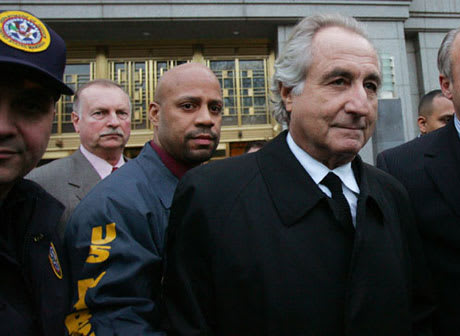The latest subject of white-collar crime activist filmmaking is Bernie Madoff, that detestable Wall Street fraudster and conspirator of a 50-billion Ponzi/Pyramid scheme. Based on the title, Chasing Madoff isn't about the man himself, but the team of men chasing him down, specifically chief whistleblower Harry Markopolos, a Boston financial manager, who at first sought to compete directly with Madoff for clients, until he discovered the damning evidence of market fraud, thus compelling him to embark upon a decade-long journey to expose Madoff's crimes.
Like fine financial docs Inside Job (Charles Ferguson), Casino Jack the United States of Money (Alex Gibney) and the Sundance-screened The Flaw (David Sington), Chasing Madoff is effectively harsh towards not only Madoff, but the SEC (Securities and Exchange Commission), The Wall Street Journal and other checks and balances set up to prevent this shocking miscarriage of justice.
Director Jeff Prosserman takes an especially clinical approach, employing most of the same cinematic techniques as the great Errol Morris (Thin Blue Line, The Fog of War, Tabloid): centre-framed interviewees against monochrome backgrounds looking directly into the camera. Morris has been doing this for 30 years, and as used by Prosserman, his techniques are still effective. Prosserman also employs a significant amount of well-executed digital effects to transition between interviews ― the effect of scrolling through photos on a touch phone or iPad. His dramatic recreations are also in the Morris style: abstractly visualized scenes that fill in the visual gaps of his subjects' testimony.
Prosserman's clinical approach wears though, specifically Markopolos's emotionally detached testimony, which dampens the dramatic tension. Unlike Inside Job, Chasing Madoff simmers but never boils.
After the ten-year odyssey of Markopolos risking the safety of his family to "do the right thing," Madoff is caught by the same market he manipulated for so long ― the financial crisis of 2008. Not even Madoff could escape the pressure of the sub-prime mortgage affair, thus toppling his precarious house of cards almost instantly. Does this render Markopolos's efforts obsolete? Perhaps. With or without Markopolos, the financial crisis would have happened and Madoff would have gone down, which consequently reduces the dramatic power of the film.
And though it's a different film, we also can't help but want to know more about the actual Bernie Madoff and how a wealthy, educated man would commit such heinous crimes. I suspect that might be a better story. That said, Chasing Madoff accomplishes its goals and is a strong cinematic documentary informing us of the events that led to the indictment of this now infamous Wall Street criminal.
(eOne)Like fine financial docs Inside Job (Charles Ferguson), Casino Jack the United States of Money (Alex Gibney) and the Sundance-screened The Flaw (David Sington), Chasing Madoff is effectively harsh towards not only Madoff, but the SEC (Securities and Exchange Commission), The Wall Street Journal and other checks and balances set up to prevent this shocking miscarriage of justice.
Director Jeff Prosserman takes an especially clinical approach, employing most of the same cinematic techniques as the great Errol Morris (Thin Blue Line, The Fog of War, Tabloid): centre-framed interviewees against monochrome backgrounds looking directly into the camera. Morris has been doing this for 30 years, and as used by Prosserman, his techniques are still effective. Prosserman also employs a significant amount of well-executed digital effects to transition between interviews ― the effect of scrolling through photos on a touch phone or iPad. His dramatic recreations are also in the Morris style: abstractly visualized scenes that fill in the visual gaps of his subjects' testimony.
Prosserman's clinical approach wears though, specifically Markopolos's emotionally detached testimony, which dampens the dramatic tension. Unlike Inside Job, Chasing Madoff simmers but never boils.
After the ten-year odyssey of Markopolos risking the safety of his family to "do the right thing," Madoff is caught by the same market he manipulated for so long ― the financial crisis of 2008. Not even Madoff could escape the pressure of the sub-prime mortgage affair, thus toppling his precarious house of cards almost instantly. Does this render Markopolos's efforts obsolete? Perhaps. With or without Markopolos, the financial crisis would have happened and Madoff would have gone down, which consequently reduces the dramatic power of the film.
And though it's a different film, we also can't help but want to know more about the actual Bernie Madoff and how a wealthy, educated man would commit such heinous crimes. I suspect that might be a better story. That said, Chasing Madoff accomplishes its goals and is a strong cinematic documentary informing us of the events that led to the indictment of this now infamous Wall Street criminal.
